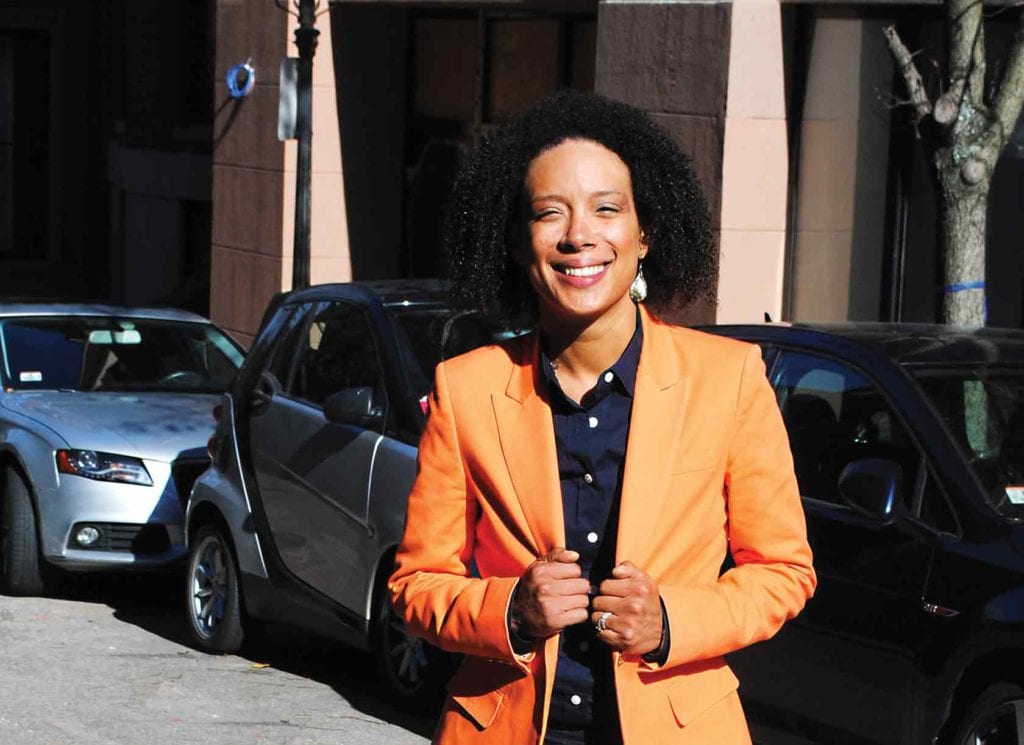Political consultant trades on organizing experience
After Pressley campaign, Rivera is ready to grow her firm

When Ayanna Pressley launched her campaign for the 7th Congressional District at the Central Square restaurant La Fábrica back in February, Wilnelia Rivera observed the roomful of political activists with an air of quiet satisfaction.
Pressley had tapped Rivera in November 2017 to serve as her campaign’s chief strategist and advisor. Over the next few months, Rivera used her years of campaign management experience to help assemble a top-notch team, including a campaign manager, finance director, organizers, field director and political director.
At the Feb. 13 campaign launch, a broad cross-section of activists from Boston, Cambridge and Chelsea mingled as Pressley took to the stage, backed by elected officials and influencers from the district. Her purple-and-white campaign sign adorned the lectern and was projected on the wall behind her. Everything about the event conveyed the quiet confidence of a winning campaign.
Born in Rio Piedras, Puerto Rico, Rivera moved to Lawrence with her mother when she was 8 years old. After graduating from Tufts University with a major in international relations and women’s studies, she went to work in Chicago as a political director for AFSCME Council 31, a union representing workers in child care and health care. After three years of legislative work and worker organizing, Rivera returned to Massachusetts for an organizing job with Neighbor to Neighbor, a political organizing group active in Massachusetts cities including Boston, Holyoke, Worcester and Springfield.
“Neighbor to Neighbor will always be my political home,” Rivera said. “Everything I do — movement building work, campaigns — I learned there.”
There she worked on school committee and city council campaigns, legislative races and statewide campaigns. She managed a statewide table of progressive organizations in Massachusetts, helping with get-out-the-vote and fundraising efforts.
After seven years at Neighbor to Neighbor, Rivera was offered a job as executive director. She chose instead to return to Tufts for a graduate degree in urban planning.
Armed with that degree, Rivera continued gaining political experience, working as a deputy director in charge of get-out-the-vote efforts for former Gov. Deval Patrick’s 2010 re-election campaign, followed by a stint as the governor’s director of external affairs.
After more than 10 years of political work, Rivera decided in 2015 to hang out her own shingle, launching Rivera Consulting Inc.
“I got tired of doing the same work over and over,” she said.
Among Rivera’s first clients was the Barr Foundation, which hired her to spearhead a project advocating for bus rapid transit, a system of dedicated lanes and enhanced fare collection systems aimed at increasing the speed and reliability of bus routes. She drew on her urban planning degree to work on implementation of pilot projects in locations including Washington Street in Roslindale.
Rivera was knee-deep in work with nonprofit clients when Pressley came knocking last November. Although she had walked away from campaign work, Rivera didn’t take long to get to “yes.”
“The challenges of the campaign were what drew me to it,” she said.
Pressley was taking on popular incumbent Michael Capuano, an unabashed liberal in a liberal-leaning district. Pressley, who did not differ with Capuano substantively on the issues, would become the first black woman elected to Congress in Massachusetts.
“Knowing what I know about how hard it is for women of color to get elected, I knew that if the campaign was run as a traditional operation, it wouldn’t have worked,” Rivera said. “You had to build a team for the candidate that’s complementary of her values. I knew that as a woman of color, I could build a team that would honor [Pressley’s] values and that she would honor the contribution I could make to help deliver her victory.”
The Pressley campaign defied conventional wisdom, targeting unlikely voters — young adults and communities that don’t commonly turn out in primaries. Meanwhile, pollsters relying on likely voters consistently put Capuano ahead of Pressley.
In what some pundits called “the year of the angry woman,” large swaths of the electorate were fired up, outraged by the anti-immigrant and often anti-black policies and proclamations emanating from Washington. The Pressley campaign’s commitment to reaching out to disaffected voters met the perfect storm of pervasive moral outrage and contentious down-ballot races with candidates pursuing similar outreach to unlikely voters, ultimately proving the pollsters wrong.
At the national level, the Democrats’ longstanding strategy of taking more moderate stances to reach out to the so-called swing voters has hampered the party’s efforts to engage younger, more progressive voters, Rivera said. Reaching those voters requires a break from the old playbook, with its emphasis on television advertisements and direct mailings.
“When you have a larger electorate of millennials and people of color, you have to spend money to reach them,” Rivera said. “If you’re a millennial, you may have lived in six different apartments in the last seven years. You’re not getting direct mail. But you may see a video on your friend’s news feed.”
Rivera says her firm remains well-positioned to help candidates reach those voters.
Ultimately, Rivera sees in the groundswell of younger, more liberal voters that swept Massachusetts and the nation promising signs for a re-invigorated Democratic Party.
“Black people, immigrant people and people of color need to come together, rebuild the party and rebuild the country,” she said. “We need to do it in collaboration with everyone else, but we need to be at the forefront.”


![Banner [Virtual] Art Gallery](https://baystatebanner.com/wp-content/uploads/2024/04/Cagen-Luse_Men-at-store-e1713991226112-150x150.jpg)



